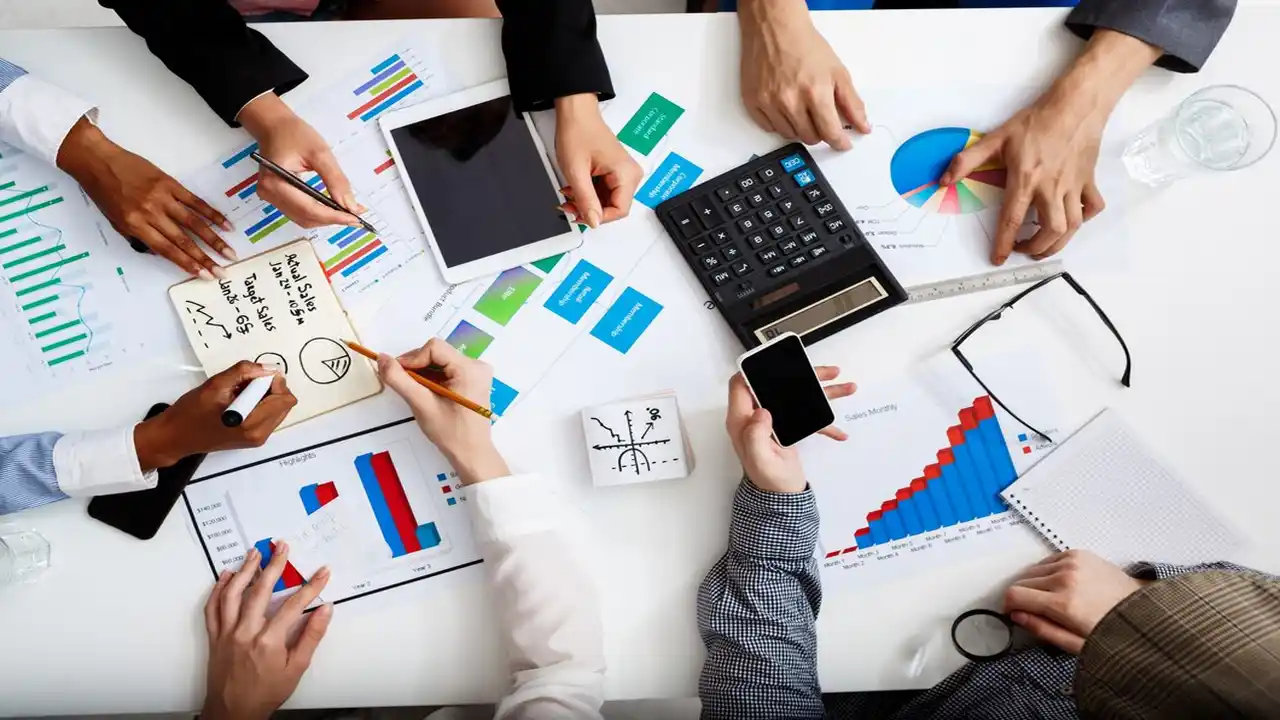The desire to find a means of obtaining funds can arise for a multitude of reasons. A new building or depot, or the acquisition of capital goods like tools, may have been on the list of priorities in the past. It may be necessary to have access to funds in this instance, as the production of a new product might be quite costly. Employees of the company usually chip in to support these kinds of endeavors. Read on to discover everything there is to know about sources of business finance and to become a subject matter expert on it.
On the flip side, funding for tool purchases could originate from sources outside the company. Many businesses rely on overdrafts or short-term loans to maintain a steady flow of funds due to the scarcity of capital in the market. The goals of a corporation and its industry are two factors that could cause interest rates to change.
Since we do receive some revenue from affiliate sales, we are able to keep our review and advise prices low for our readers.Are you able to come up with an excellent company plan? Everything is fine! Is everything you set out to do here? Everything is fine! What about the cost? Have you thought about that?When they reach this point, most would-be entrepreneurs give up.There is a plethora of financial resources available to people who are just starting out and looking for ways to finance their growth. This article will describe a few terms used in the field of company finance and go over the six most common ways that companies get money.
Sources of Business Finance
If you’re thinking about starting a business, you should take care of yourself first. Use your own funds or valuable possessions as security to secure the loan. This shows that you are dedicated to the project you’ve been working on for a long time and are prepared to take risks, which is important for possible investors and financial institutions. For your research and knowledge purposes, below is a list of sources of business finance.
Family Network
It might be easier for small businesses to secure financing from individuals they know and trust, such relatives and family. Because they know you and your company, your friends and family are more than happy to lend a hand. Because it is hard to get money until a business has a history and a credit rating, it is usually used by people who are just starting out on their own. In the right situations, this kind of loan might be life-changing, but unfortunately, not everyone can get one. Treat the deal carefully, with documented conditions and an agreement, just like it came from a bank. This is an important consideration. In order to keep disagreements and fights at bay, this is done.
Funding from Within
The term “internal sources of finance” was first used to denote funding that originates from inside an organization. There are several ways in which a company can raise capital from inside. Some of the most common ones include selling assets, keeping profits, and selling owners’ capital.A company’s “owners capital” refers to the owner’s personal financial investment. This is usually funded out of their own pockets. The term “personal savings” refers to money that an entrepreneur sets away for their own use. Since there are no interest fees associated with this type of financing, the business is not obligated to pay anything.
Nontraditional Finance
With “money from outside a company,” we imply that the source of the funds is not the business itself. There are many different ways that a firm might raise capital. Some of these include personal savings, loans from family and friends, government grants, trade credit, leasing, hire buy, new partners, venture capitalists, and overdrafts from banks.
Relatives and friends People close to the company owner may be able to lend or borrow money from them. Repayment of the funds is optional and can incur little or no interest if at all. If you or your company need money, you can get it through a “bank loan” or any other similar arrangement. Borrowing money from a bank usually comes with an interest payment schedule that can be anywhere from a few years to decades long. This is good sources of business finance.
Business Mortgage
Real estate investment is a good option for company expansion. A business mortgage is available with terms of up to 25 years and interest rates of 70% to 75%. The maximum amount you can borrow for investment reasons is 65% of the purchase price. The property’s rental revenue is the determining factor in the maximum loan amount.
People often assume that business mortgages have more expensive interest rates compared to regular home mortgages. Because of this, interest rates are very high and unlikely to stay that way for the foreseeable future. But compared to business loans, industrial mortgages have far higher interest rates. In addition, you can reduce your taxable income by deducting mortgage interest, and you can make up the difference in interest payments by renting out the property.
Bank Loan
People often think about bank loans as one of the initial choices when they are weighing all of their possibilities. Since it is simple and straightforward, this is the usual way that people gather funds. In most cases, the money disperse all at once over a set duration. Interest is a part of the debt that needs to be repaid. Either a constant rate or an adjustable rate of interest might use. The company’s owners will unaffect, and the individual is free to spend the money anyway they like. Beyond that, they might be useful in boosting cash flow.
The ability to secure company loans from banks is a huge boon for startups, provided that they can offer sufficient collateral.Bank loans aren’t always an option, and getting one can be a hassle due to the complicated application process and long wait times.Banks want to see solid proof that you can run a successful company and pay back their loans on schedule, so a solid business plan is a must.
Funding for Equity
Selling investors shares in a firm is one way to generate revenue. The term for this is “private equity.” These shareholders care about the company’s success because it affects the value of their stock. They may provide valuable skills, knowledge, and connections that will propel the business forward. There are several forms of equity financing, including venture capital and angel funding.
Financial Assets
Businesses often turn to asset financing as a means to acquire costly gear or tools or to access capital from assets they currently possess.Three forms of asset financing—hire-buy, finance leases, and operating leases—are available for the acquisition of new things. Secure your debts against anything you own with asset financing, sometimes called asset-backed lending, in the event that you can’t repay the loan in full.One key distinction between asset financing and other asset-based loan types is that with asset financing, the lender’s acquired asset doubles as security for the loan. Therefore, no extra security from the business is necessary. We will primarily cover the following types of asset financing.
One type of secured loan is the mortgage, which you may be aware of. The lender is use the property as collateral. Loss of control is inevitable if you can’t pay your bills. Additional fixed assets may be required by some lenders as collateral for loans. Talking to a bank broker is crucial if you want the best deal. With the help of a mortgage broker, you may narrow down your loan-to-value ratio options and find the best lenders to apply to.
Loan Funding
One way to get money is to borrow it from a bank and then promise to pay it back with interest. This payment can make in full or in installments at your convenience. You are not need to relinquish any control or shares in your company in order to acquire equity. Bank loans, overdrafts, and asset financing are just a few examples of the many forms that debt financing can take. This is another sources of business finance.
Business Cards
Because it is one of the easiest ways to get money, it is perfect for regular transfers and transactions. The fact that it may be utilized by more than one person makes it ideal for this kind of buy. The interest rates on business credit cards can be so high that they’re not usually a smart choice for making big expenditures. When making modest purchases that can pay off quickly, a business credit card is the way to go. Borrowing money using a credit card will nearly always end up costing you money in the form of interest and fees, however there are occasional deals that offer 0% interest. You can’t get in without a credit score and some proof of success for your business.
Emergency Fund
Because of its versatility and potential use as a fallback, an overdraft option is an excellent substitute. Many mistakenly assume that this form of funding is short-term and easy to establish.You can borrow money this way, but it’s usually for smaller amounts and the interest and fees add up quickly. The fact that the bank can reverse overdrafts is another important consideration. Only well-known companies are usually awarded overdrafts, which are unsecured loans. This is because of how the loan is structured.
Personal Accounts
Most new businesses, as said before, depend on the entrepreneur’s own savings or investments. A person’s “personal savings” can also define as whatever amount of money they have saved up over a period of time. A personal debt service may be able to help the company get the money they need. It’s also conceivable that they see working for free! The notes that follow provide a more in-depth discussion of these.
Cash Advance
Any business that has a credit card terminal on hand can apply for a merchant cash advance. Through the terminal source, one can get in touch with the lender. The money comes from lenders who want a cut of the company’s daily credit card sales. Your company’s cash flow can be monitored by the terminal provider. This makes the loan more secure because you can agree on a loan amount and repayment plan depending on your monthly income and other sources of income.
FAQ
In the Medium to Long Term, where can i Find Funding?
Consider medium-term sources when you require funds for a period longer than a year but shorter than five years. Funding sources: commercial bank loans, public savings, lease financing, and loans from financial institutions. Timeline: next three years.
In Order to Get Money, what are the Two Main Ways to do It?
There are mainly two forms of funding that can consider:Financing through debt means taking out a loan from an institution like a bank, credit union, or building society.Money like this comes from “equity finance” sources inside your own organization.
How does One Go about Getting Capital to Launch a Company?
A loan can be available to you through a bank. This is because most small and medium-sized businesses (SMEs) turn to bank loans when they need funding. Keep in mind that there are perks to using several banks, such as different payment methods and personalized service. It is also a good idea to look at several banks and choose one that suits your needs.
Final Words
Discuss your options with an expert (such an accountant) and look into all of your options carefully before making a decision. If you work with a business finance broker, you may learn more about and make better use of these funding options.Not every organization can rely on the same funding mechanism. Considerations such as situation, purpose, cost, and risk can guide the selection of the source.*not included* We hope this guide, in which we discussed sources of business finance, was informative and beneficial for you. For an in-depth analysis of the features of business finance, read more and gain valuable insights from it.






